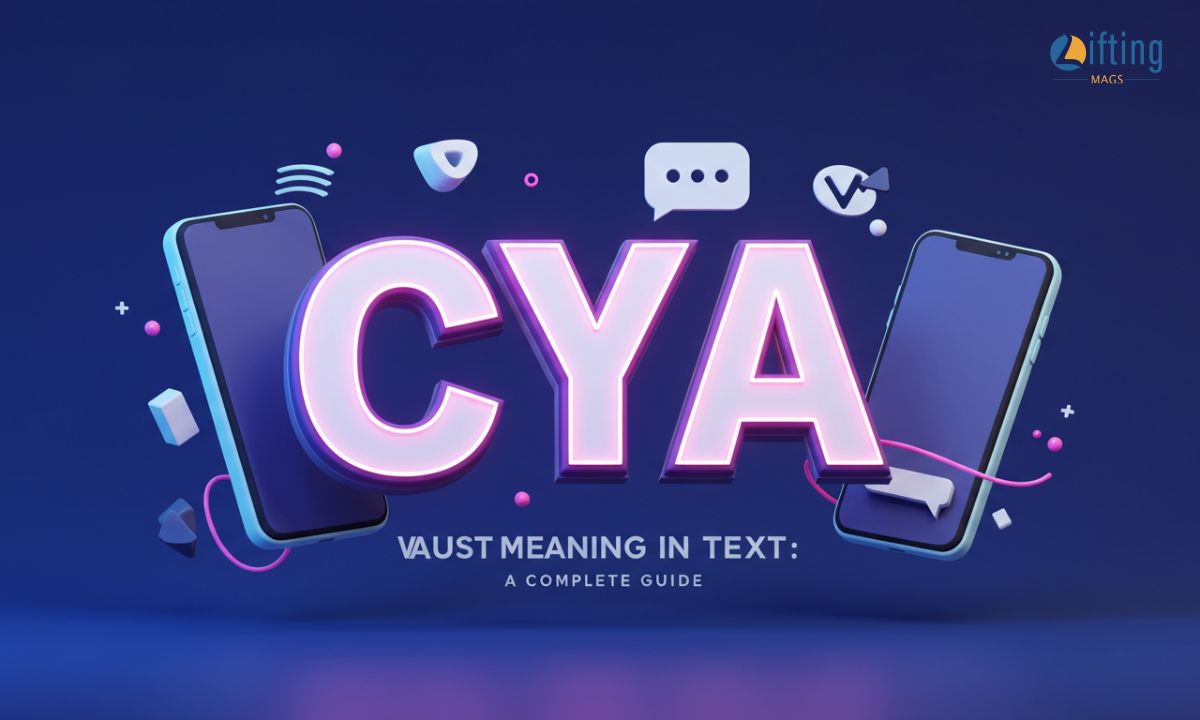In today’s fast-paced digital world, slang terms have become an integral part of our daily communication. Among these abbreviations, “CYA” stands out as a versatile and frequently used expression. But what does “CYA” mean, and how can it affect your conversations? In this comprehensive guide, we’ll explore its definitions, usage contexts, history, and much more, providing you with a thorough understanding of this common slang.
Definition & Meaning
What Does CYA Stand For?
“CYA” can represent two primary meanings, each applicable in different contexts:
- See You Around:
- This is a casual way to say goodbye, often used among friends or acquaintances.
- Example: “Had a great time today! CYA soon!”
- Cover Your Ass:
- This slang phrase implies protecting oneself from potential blame or misunderstanding, often used in professional settings.
- Example: “Make sure to send that email—CYA if they forget.”
Understanding the context is crucial, as the same abbreviation can convey entirely different sentiments depending on how it is used.
Real-Life Examples
To illustrate the meanings of “CYA,” let’s look at some real-life scenarios:
- Casual Texting:
- A friend texts: “I can’t make it to the party tonight. CYA next time!”
- Professional Setting:
- In a work chat, a colleague writes: “Don’t forget to document your work—CYA in case there’s any confusion later.”
These examples highlight how versatile “CYA” can be in both informal and formal communication.
Background & History
The Evolution of CYA
The term “CYA” has evolved significantly over the years:
- 1990s–2000s: “CYA” gained popularity in early internet chat rooms and text messaging as a quicker alternative to saying goodbye. This was particularly useful in fast-paced environments where brevity was essential.
- Military and Corporate Roots: The “Cover Your Ass” interpretation has origins in military and corporate slang, dating back to the mid-20th century, emphasizing self-preservation in high-stakes environments.
Cultural Shift
As communication styles have evolved, so has the usage of “CYA.” It has shifted from a purely informal expression to one that can also be applicable in professional spheres, albeit with caution.
Usage in Different Contexts
1. Casual Texting & Social Media
In casual texting and social media, “CYA” serves as a friendly sign-off. It allows individuals to maintain a light-hearted tone while closing a conversation.
- Example: After a fun outing, a friend might say, “Great catching up! CYA soon!”
2. Gaming
In the gaming community, “CYA” is commonly used to signal a temporary goodbye.
- Example: After finishing a match, a gamer might say, “GG! CYA in the next round.”
3. Professional Settings
In professional environments, “CYA” is often used to remind colleagues of the importance of documentation and accountability.
- Example: A manager might say, “Always send a follow-up email—just to CYA.”
Using “CYA” in a work context can be effective, but it’s essential to gauge the appropriateness based on the workplace culture.
Common Misconceptions
Myth vs. Truth
Several misconceptions surround the use of “CYA”:
- Myth: “CYA” always means “See You Around.”
- Truth: It can also mean “Cover Your Ass,” making context essential.
- Myth: It’s always appropriate in work emails.
- Truth: Using “Cover Your Ass” can sound unprofessional; opting for more formal language is advisable.
Understanding these misconceptions can help prevent misunderstandings and ensure effective communication.
Similar Terms & Alternatives
Here are some similar terms and alternatives to “CYA,” along with their meanings and best usage scenarios:
| Term | Meaning | Best Used In |
|---|---|---|
| TTYL | Talk To You Later | Casual texting |
| BRB | Be Right Back | Quick pauses in chat |
| FYI | For Your Information | Professional updates |
| Document for records | Formal way to say “CYA” | Work emails |
These alternatives can enhance communication by providing more precise expressions depending on the context.
How to Respond to “CYA”
When someone uses “CYA,” your response can vary based on the relationship and context:
- Casual Responses:
- “Later! 😊”
- Humorous Replies:
- “Don’t forget to CYA too! 😆”
- Professional Responses:
- “Thanks, I’ll keep records.”
Tailoring your response can help maintain the tone of the conversation and strengthen your relationships.
Regional & Cultural Differences
The interpretation of “CYA” can vary significantly based on geographical and cultural contexts:
- US/UK: Primarily understood as “See You Around.”
- Australia/Canada: More commonly recognized as “Cover Your Ass,” particularly in workplaces.
Being aware of these regional differences can help avoid misunderstandings, especially in international communications.
Is It Offensive?
Context Matters
While “See You Around” is generally harmless, “Cover Your Ass” can be perceived as rude or unprofessional in formal settings. Here are guidelines to navigate this:
- Casual Contexts: Using “CYA” among friends is typically acceptable.
- Professional Contexts: Use discretion when opting for “Cover Your Ass.” If unsure, consider more formal alternatives.
Being mindful of context can enhance your communication effectiveness.
Professional Alternatives
If you’re looking to replace “CYA” in professional communications, consider the following phrases:
- For documentation purposes…
- Let’s keep a record.
These alternatives convey the same intent without risking unprofessionalism, ensuring clarity and respect in workplace communication.
FAQs
1. Is “CYA” rude?
Only if used as “Cover Your Ass” in formal communications. In casual settings, it’s generally harmless.
2. Can I use “CYA” with my boss?
You can if it clearly means “See You Around.” Otherwise, opt for a more professional sign-off.
3. What’s the most common meaning of “CYA”?
In casual texting, “See You Around” is the most common interpretation.
4. How can I clarify my intent when using “CYA”?
Consider adding context, such as “CYA later, hope to catch up again!” This makes your intent clear.
Conclusion
In summary, “CYA” is a versatile slang term that can express both casual farewells and professional caution. Understanding its meanings, appropriate contexts, and alternatives can enhance your communication skills significantly. Next time you encounter “CYA,” you’ll be equipped with the knowledge to respond appropriately and engage meaningfully.
Take a moment to reflect on how you use slang in your own conversations. Have you ever used “CYA” in an unexpected context? Share your experiences in the comments below!
Additional Resources
For further reading on digital communication and slang, consider exploring the following articles:
- The Evolution of Digital Slang
- Effective Workplace Communication
- Understanding Informal Language in Texting
By staying informed about these topics, you can navigate the ever-changing landscape of communication with confidence and ease.

